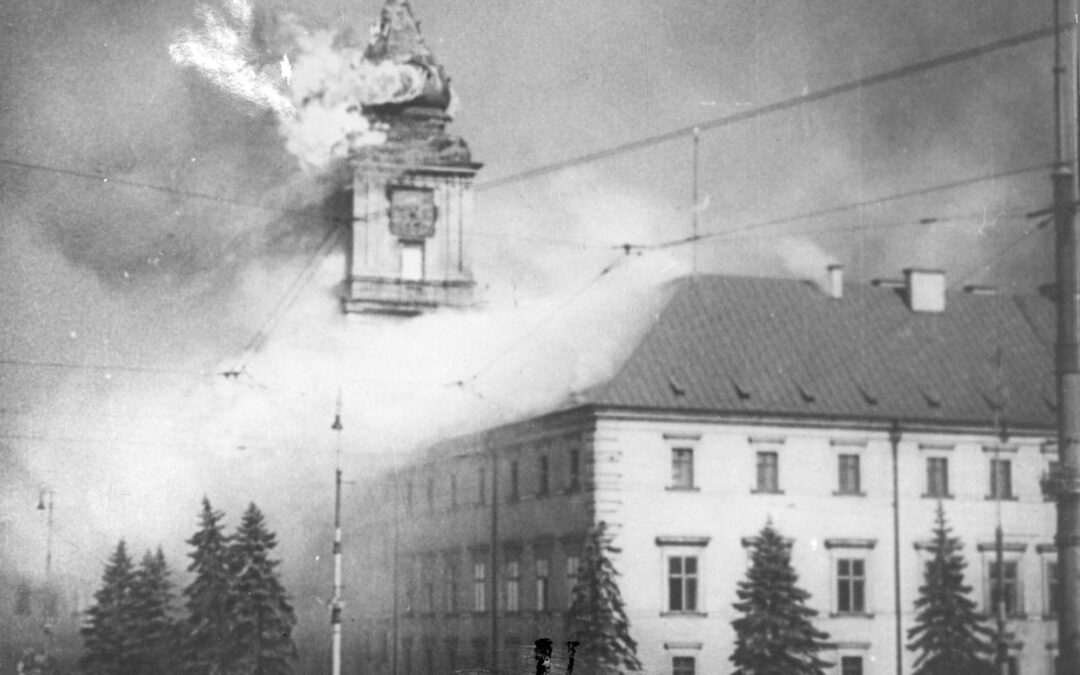Poland’s ruling Law and Justice (PiS) party has announced that the government will make a claim for war reparations from Germany. It says that losses caused by the Nazi-German invasion and occupation of 1939-1945 amount to $1.3 trillion. Berlin, however, has long argued that the issue was legally settled in the 1950s and no reparations are owed.
PiS chairman Jarosław Kaczyński has also welcomed Israel to join Poland’s claim, as Polish Jews made up a large proportion of those killed in occupied Poland during World War Two.
Today’s declaration came during commemorations of the anniversary of Nazi Germany’s invasion of Poland on 1 September 1939, which marked the start of the war and six years of brutal occupation.
During a ceremony in Warsaw’s Royal Castle (which was destroyed during the war – as pictured above – and subsequently rebuilt), a report was presented outlining calculations of the damage caused by Germany in Poland during the war.
“The presentation of this report…[marks] a decision to take up this matter in the international arena,” said Jarosław Kaczyński, who as PiS chairman is Poland’s de facto leader. “These actions include asking Germany to start negotiations on reparations.”
“It is about obtaining compensation for what the Germans did,” he continued. “Many countries received compensation from Germany, but not Poland…The Germans have never accounted for their crimes against Poland.”
“The sum of losses has been calculated at 6.2 trillion zloty ($1.3 trillion),” Kaczyński declared. “Such compensation will be paid for decades, but it is bearable for the German economy.”
Prezes #PiS J. #Kaczyński w #Warszawa: Suma strat została wyliczona na 6,2 bln zł. Takie odszkodowania płaci się przez dziesięciolecia, ale jest ono do udźwignięcia przez niemiecką gospodarkę. #RaportStratWojennych pic.twitter.com/daByYu1QiL
— Prawo i Sprawiedliwość (@pisorgpl) September 1, 2022
Kaczyński admitted that “we are entering a difficult and long path…[but] we are sure that we will be successful”. He also warned that “adopting the approach that we are not entitled to compensation is a path to enslavement”.
Noting that “a significant proportion of those murdered by the Germans are Poles of Jewish origin”, Kaczyński said that “if the state of Israel wants to join our action we are ready for it”.
In 2017, PiS established a parliamentary committee to calculate the losses caused by Germany’s wartime occupation of Poland. It completed its work in 2019, but the report subsequently remained unpublished.
At today’s ceremony, Elżbieta Witek, the speaker of parliament, thanked all those who had contributed to the calculations. “Forgiveness cannot be equal to forgetting the obligation to compensate for damages and losses that the Germans caused to Poles,” she declared.
Speaking after her, Prime Minister Mateusz Morawiecki noted that the “aim of the Germans [during the war] was not only destruction but annihilation”.
The six million Polish citizens killed in the war represented 17% of the population, the highest proportional losses of any country during the war. Around half the victims were Polish Jews.
The impact of such losses “is felt to this day”, added Morawiecki. “We lost the elite, outstanding engineers and scientists. And the entire Polish economy could not develop normally.”
Premier @MorawieckiM w #Warszawa: Przez II wojnę światową Polska straciła szansę na rozwój. Jest to odczuwalne do dziś, bo straciliśmy elity, wybitnych inżynierów, czy naukowców. A cała polska gospodarka nie mogła się normalnie rozwijać. #RaportStratWojennych pic.twitter.com/iWI0yk5Hnk
— Prawo i Sprawiedliwość (@pisorgpl) September 1, 2022
For its part, Germany has long argued that, while it accepts complete responsibility for the war and the losses it caused, the issue of reparations was settled in the 1950s, when Poland renounced its claim.
However, the head of Poland’s parliamentary reparations committee, PiS MP Arkadiusz Mularczyk, has argued that there is no document providing a legal basis for this position. Others note that Poland, with its Soviet-backed communist government, was not a truly independent state at that time.
Mularczyk expressed hope last year that the election of a new German ruling coalition, which contains parties more open to the idea of reparations, could open up new opportunities to settle the issue.

Daniel Tilles is editor-in-chief of Notes from Poland. He has written on Polish affairs for a wide range of publications, including Foreign Policy, POLITICO Europe, EUobserver and Dziennik Gazeta Prawna.




















